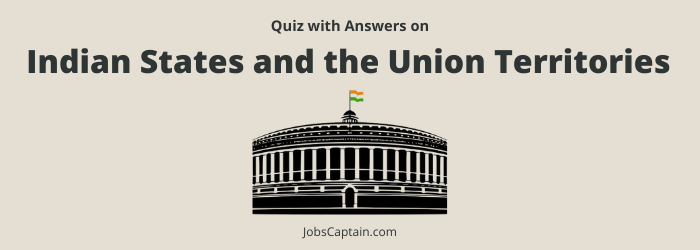
Take this GK Quiz on Indian States and Union Territories to improve your knowledge about our country. This quiz covers important facts about each state and union territory, so test your knowledge now!
Prepare for your exams by testing your knowledge on the Indian States with our questions and answers.
| Quiz Set | 1 | 2 | Indian Polity and Governance Quiz |
Question 1: Who among the following has the executive power to admit a State in the Union or establish new States?
(A) Parliament
(B) Lok Sabha
(C) Political Parties
(D) Central Government
Question 2: If a new state is to be formed, which schedule of the constitution will need to be amended?
(A) Fifth
(B) Third
(C) Second
(D) First
Question 3: According to Article 1 of Indian Constitution, India is ___________.
(A) Group of States
(B) Federation of States
(C) Confederation of States
(D) The Union of States
Question 4: How many States and UTs did the States Reorganisation Commission create in 1956?
(A) 14 States and 6 UTs
(B) 17 States and 6 UTs
(C) 14 States and 8 UTs
(D) 17 States and 8 UTs
Question 5: Indian Parliament has the power to create a new State under which of the following Constitutional provisions?
(A) Article 1
(B) Article 2
(C) Article 3
(D) Article 4
Question 6: How many States and Union Territories are there in India?
(A) 25 States and 7 Union Territories
(B) 28 States and 8 Union Territories (including national capital territory-1)
(C) 24 States and 6 Union Territory
(D) None of the above
Question 7: Which one of the following is empowered to alter the boundaries of States under the Constitution of India?
(A) Parliament
(B) Lok Sabha
(C) President
(D) Supreme Court
Question 8: In which year were the Indian States reorganized on the recommendation of the State Reorganisation Commission?
(A) 1947
(B) 1951
(C) 1956
(D) 1966
Question 9: Which one of the following is not correct in the matter of formation of new States?
(A) Parliament may by law form a new State
(B) Such law shall contain provisions for the amendment of the First Schedule and the Fourth Schedule of the Constitution
(C) Such law shall be deemed to be an amendment of the Constitution for the purpose of Article 368
(D) No Bill for enacting such law shall be introduced in the Parliament unless it has been referred to the Legislature of the States, whose areas, boundaries or name is affected
Question 10: Which of the following is not a Union Territory?
(A) The Andaman and Nicobar Islands
(B) Jammu and Kashmir
(C) Goa
(D) Puducherry
Question 11: A Bill for the purpose of creating a new State in India must be passed by _________.
(A) A simple majority in Parliament and ratification by not less than two-third of the States
(B) A simple majority in Parliament
(C) A two-third majority in Parliament and ratification by not less than two-third of the States
(D) None of the above
Question 12: The capital of which state has not been renamed after the attainment of freedom?
(A) Tamil Nadu
(B) West Bengal
(C) Kerala
(D) Andhra Pradesh
Question 13: Creation of a new state requires a ………. majority for Constitutional Amendment.
(A) Simple
(B) Two-third
(C) Three-fourth
(D) Two-third plus ratification by half of all states
Question 14: Delhi is a/an __________.
(A) State
(B) Union Territory
(C) Autonomous Council
(D) None of the above
Question 15: Union Territories in India are administered by __________.
(A) The President
(B) The Lt. Governor
(C) Home Minister
(D) Administrator
Question 16: By which Constitutional amendment Delhi was given the status of National Capital Region?
(A) 67th
(B) 69th
(C) 68th
(D) 70th
Question 17: Which among the following is not a ‘constitutional provision for the formation of new States’?
(A) Increase the area of any State
(B) Diminish the area of any State
(C) Alter the name of any State
(D) A State may include a Union territory
Question 18: Which one of the following statements is incorrect?
(A) Goa attained full statehood in 1987
(B) Diu is an island in the Gulf of Khambhat
(C) Daman and Diu were separated from Goa by the 56th Amendment of the Constitution of India
(D) Dadra and Nagar Haveli were under French colonial rule till 1954
Question 19: Power to include or admit any State into Union of India is given to ___________.
(A) President of India
(B) Prime Minister
(C) Parliament
(D) Supreme Court
Question 20: Sikkim became a state of India under ___________.
(A) 30th Amendment
(B) 32nd Amendment
(C) 35th Amendment
(D) 40th Amendment
| Quiz Set | 1 | 2 | MCQ on Indian Polity and Governance |
